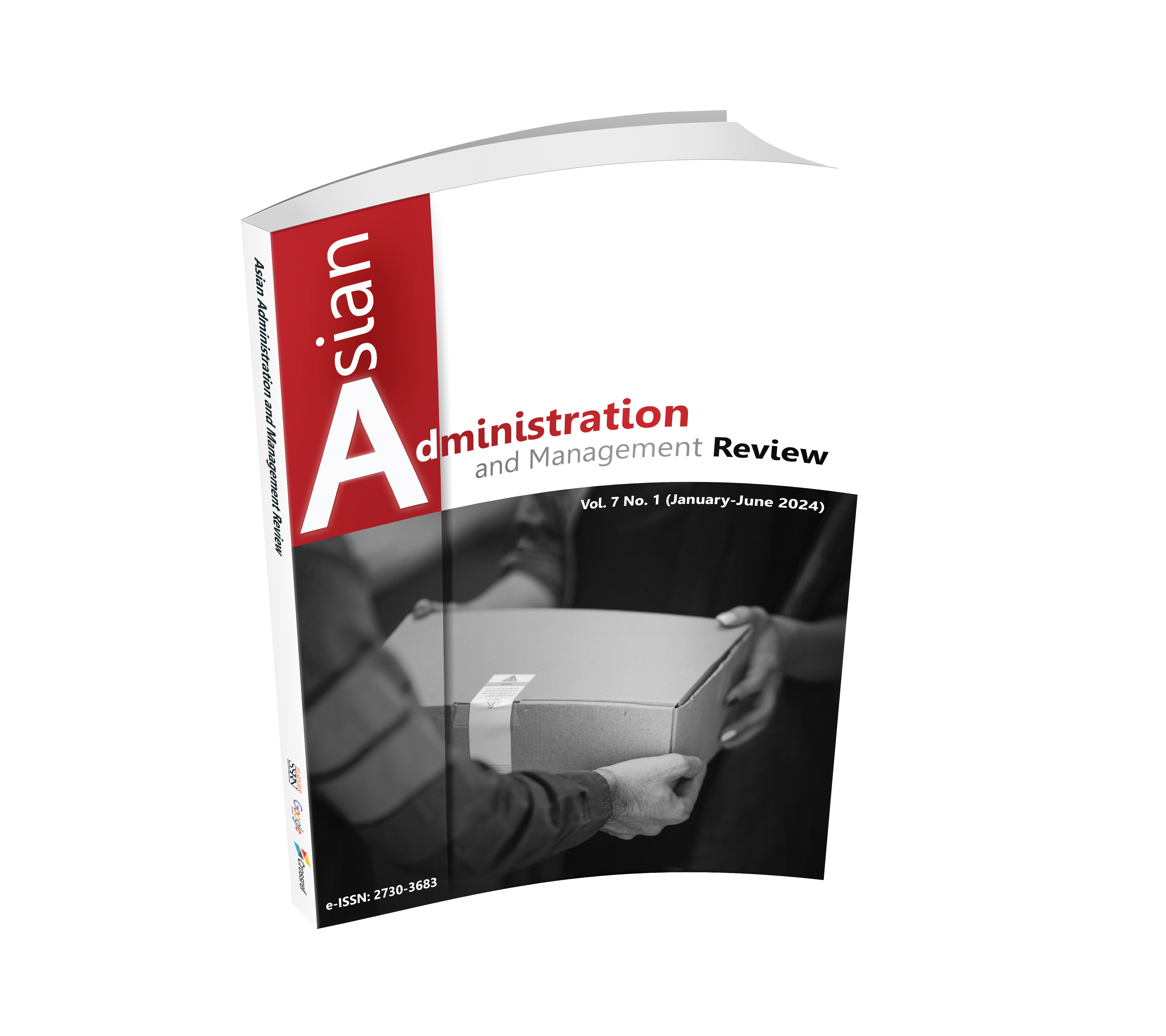SCOR MODEL FACTORS AFFECTING THE SUCCESS OF FOOD DELIVERY BUSINESS IN THAILAND
DOI:
https://doi.org/10.14456/aamr.2024.4Keywords:
SCOR Model, Food Delivery, Supply Chain Management, ThailandAbstract
The contemporary food delivery industry in Thailand has witnessed exponential growth, prompting the need for an analysis of critical success factors. This study explores the application of the SCOR (Supply Chain Operations Reference) model to identify factors crucial to the outcomes of food delivery businesses. Through empirical analysis, the study reveals that effective planning strategies are essential for enhancing sourcing activities and, consequently, delivery operations. Additionally, strategic sourcing activities significantly contribute to improving the production process, emphasizing that acquiring quality resources enhances the capacity to produce goods and services efficiently. While sourcing plays a vital role, it may not be the sole determinant of successful delivery and returns. Other variables, such as logistical efficiency, transportation, and customer service, can also impact these processes, as indicated by the research. Interestingly, the direct effect of the production process on delivery and returns appears to be insignificant. The findings underscore the importance for Thai food delivery companies to prioritize well-structured planning and astute sourcing strategies to enhance overall performance. This paper serves as a foundational resource for food delivery industry stakeholders, providing strategic insights for improved operational outcomes. For a comprehensive understanding of the industry's dynamics, additional research is recommended to dissect specific factors influencing delivery and return processes.
Downloads
References
Ahmed, B., & Ahmed, R. (2016). Evaluation of Supply Chain Based on SCOR Model Theory: A Case Study of FOODPANDATM. A paper presented at the International Conference on Innovation and Emerging Trends in Business Management 2016, IQRA University, Pakistan.
Akyuz, G., & Erkan, T. (2010). Supply chain performance measurement: a literature review. International Journal of Production Research, 48(17), 5137-5155.
Barrett, P. (2007). Structural equation modelling: Adjudging model fit. Personality and Individual differences, 42(5), 815-824.
Bechtel, C., & Jayaram, J. (1997). Supply chain management: a strategic perspective. The International Journal of Logistics Management, 8(1), 15-34.
Brayfield, A., & Rothe, H. (1951). An index of job satisfaction. Journal of Applied Psychology, 35(5), 307-311.
Chotigo, J., & Kadono, Y. (2021). Comparative analysis of key factors encouraging food delivery app adoption before and during the COVID-19 pandemic in Thailand. Sustainability, 13(8), 4088.
Fornell, C., & Larcker, D. (1981). Evaluating Structural Equation Models with Unobservable Variables and Measurement Error. Journal of Marketing Research, 18(1), 39-50.
Georgise, F., Thoben, K., & Seifert, M. (2012). Adapting the SCOR Model to Suit the Different Scenarios: A Literature Review & Research Agenda. International Journal of Business and Management, 7(6), 2-17.
Giannakis, M., & Croom, S. (2004). Toward the Development of a Supply Chain Management Paradigm: A Conceptual Framework. Journal of Supply Chain Management, 40(1), 27-37.
Hair, J., Sarstedt, M., Ringle, C., & Mena, J. (2012). An assessment of the use of partial least squares structural equation modeling in marketing research. Journal of the Academy of Marketing Science, 40, 414-433.
Hair, J., Hult, G., Ringle, C., Sarstedt, M., Danks, N., & Ray, S. (2021). Partial Least Squares Structural Equation Modeling (PLS-SEM) Using R. Cham: Springer.
Li, C., Mirosa, M., & Bremer, P. (2020). Review of Online Food Delivery Platforms and their Impacts on Sustainability. Sustainability, 12(14), 5528.
Li, L., & Lee, Y. (1994). Pricing and Delivery-Time Performance in a Competitive Environment. Management Science, 40(5), 549-684.
Limsarun, T., Navavongsathian, A., Vongchavalitkul, B., & Damrongpong, N. (2021). Factors Affecting Consumer’s Loyalty in Food Delivery Application Service in Thailand. Journal of Asian Finance, Economics and Business, 8(2), 1025-1032.
Nabhani, F., & Shokri, A. (2009). Reducing the delivery lead time in a food distribution SME through the implementation of six sigma methodology. Journal of Manufacturing Technology Management, 20(7), 957-974.
Nemoto, T., & Beglar, D. (2014). Developing Likert-Scale Questionnaires. In N. Sonda & A. Krause. (eds.). 39th Annual International Conference on Language Teaching and Learning (pp. 1-8). Hyogo: Kobe Convention Center.
Ntabe, E., LeBel, L., Munson, A., & Santa-Eulalia, L. (2015). A systematic literature review of the supply chain operations reference (SCOR) model application with special attention to environmental issues. International Journal of Production Economics, 169, 310-332.
Ofori, G. (2000). Greening the construction supply chain in Singapore. European Journal of Purchasing & Supply Management, 6(3-4), 195-206.
Phrapratanporn, B., Thanitnan, C., Thanitnan, C., Rungsawanpho, D., Aunyawong, W., & Kochakasettrin, N. (2022). Online purchase decision on consumer goods in the context of the service value of third-party logistics service provider. Journal of Optoelectronics Laser, 41(4), 79-83.
Puriwat, W., & Tripopsakul, S. (2021). Understanding Food Delivery Mobile Application Technology Adoption: A UTAUT Model Integrating Perceived Fear of COVID-19. Emerging Science Journal, 5(Special Issue), 94-104.
Ray, A., & Bala, P. (2021). User generated content for exploring factors affecting intention to use travel and food delivery services. International Journal of Hospitality Management, 92, 102730.
Reinartz, W., Haenlein, M., & Henseler, J. (2009). An empirical comparison of the efficacy of covariance-based and variance-based SEM. International Journal of Research in Marketing, 26(4), 332-344.
Reiner, G., & Hofmann, P. (2006). Efficiency analysis of supply chain processes. International Journal of Production Research, 44(23), 5065-5087.
Sanders, J. (2015). Adaptation and Appropriation. 2nd ed. London: Routledge.
Shroff, A., Shah, B., & Gajjar, H. (2022). Online food delivery research: A systematic literature review. International Journal of Contemporary Hospitality Management, 34(8), 2852-2883.
Tran, V. (2021). Using Mobile Food Delivery Applications during the COVID-19 Pandemic: Applying the Theory of Planned Behavior to Examine Continuance Behavior. Sustainability, 13(21), 12066.
Van Weele, A. (2018). Purchasing and Supply Chain Management. Singapore: Cengage Learning.
Wu, P., & Huang, P. (2018). Business analytics for systematically investigating sustainable food supply chains. Journal of Cleaner Production, 203, 968-976.

Downloads
Published
How to Cite
Issue
Section
License
Copyright (c) 2023 Authors

This work is licensed under a Creative Commons Attribution-NonCommercial-NoDerivatives 4.0 International License.











.png)


